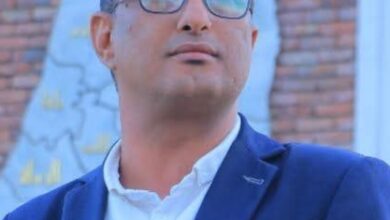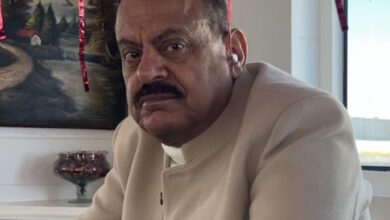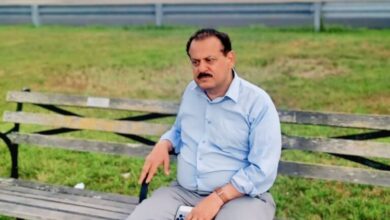A School Year in the South

Yemeni mp
Ahmed Saif Hashed
At “Al-Wahda” school, I completed the fourth grade. At the beginning of the fifth grade, I left Al-Wahda in my village of “Sharar” in the north and transferred to what we called the southern part of our beloved homeland, to a school that welcomed students from the neighboring northern regions.
“Shaab” school was infinitely better than ours in almost every aspect. The only challenge we faced was the long distance between our village and this school.
Every school day, I had to walk a distance of ten kilometers each way. I would rise before dawn and embark on my daily journey on foot to reach the school. The return trip was equally exhausting and arduous. The daily strain weighed heavily on my diligence, perseverance, and overall performance. This relentless fatigue took a toll on my body, spirit, and memory.
My toenails constantly complained from their collisions with stones during the early morning hours of my journey. The same scenario unfolded in the afternoon on my way back. I dragged my feet as fatigue weighed them down, often overwhelmed by exhaustion.
Sometimes, these collisions would cause blood to flow from the tips of my toes and beneath my nails, trickling from their roots and edges in the cold morning air. At times, I would suffer from injuries that were slow to heal, while other incidents would result in nail loss due to the severity and frequency of the impacts. Each day I traveled for school felt like a whirlpool of torment and anguish. Occasionally, I would rebel against the journey and fail to reach school, and on other days, I would leave before the end of the session, skipping one or two classes.
I felt as though the distance to school was stretching endlessly, and the pauses along the way became my solace as I reached the brink of exhaustion. The hardships I faced seemed greater than what my weary body and tired spirit could endure. This suffering made me feel as if the stones were lying in wait for me, rather than me colliding with them. I did my best to avoid them, but they managed to inflict whatever pain they could, leaving me with a great deal of discomfort and ache. Even today, the toenails of my big toes remain misshapen due to countless encounters with those stones.
There were days when I would rebel against school, choosing not to go at all. Other times, one of my peers would suggest what we called “hafsnah” or “nehafsin,” meaning skipping school, and we would support each other in this decision, never reaching the school gates. We would make it to the head of Shaab, and on some days, to the health clinic in the area, then meander back slowly until time passed, returning home at the usual hour. On rare occasions, we would not venture beyond “Tarf al-Sahbi,” doing so with caution and stealth, fearing our families would discover our absence.
Sometimes, we would buy “Marib,” “Saba,” and “Yemen” cigarettes from Mohammed Saif’s shop near the Thursday market. Those cigarettes were cheap and of poor quality, and we would find distant spots along the long path to smoke them in secret. We were rebellious against our families and school, experimenting and indulging in frivolity “siyah” away from our parents and relatives.
English class was always the last subject on the weekly schedule. The teacher was incredibly kind, skilled in his subject, and adept at teaching it. However, the distance from the school to our homes often led us to return before the last period, which was English class.
The daily exhaustion, coupled with some indiscipline and rebellion, resulted in my failure in three subjects at the end of the year, with English at the forefront. Such failure was unprecedented in my previous studies. Since failing three subjects or fewer allowed the school system to grant a chance for retesting, I was given the opportunity to retake those exams at the end of the year. I managed to pass with great difficulty, and I would not have succeeded were it not for the kind man, Al Haj Mahmoud, a resident of the middle region of Shaab.
In Al Shaab region, my father’s friends were Haj Mahmoud Hassan and his brothers, Ali and Saleh Hassan. Three brothers living under one roof, along with more than thirty family members. They epitomized brotherhood, kindness, affection, generosity, and patience. Their harmony and forgiveness were unparalleled, and their hearts were whiter than the clouds.
I studied alongside some of their children at the same school. I remember staying with them for a month or two after their persistent pleas to my father for me to live with them and pass the end-of-year exams. They even offered to support me during the retake exams. They felt compassion for the exhaustion I endured every day, as my spirit was drained by the long journey back and forth. Without Haj Mahmoud and his brothers, I would not have successfully navigated that school year.
Oh, how kind these people were! After my brother Ali was killed and my father became displaced, he lived with them for several years in their shop by the roadside. They embraced him during that time without ever causing him harm or showing impatience for a long-term guest. Instead, they overflowed with kindness and affection, enough to fill this world and more. How wonderful they were! They bestowed upon us such beauty and goodwill that we owe them a lifetime of gratitude, as their legacy will endure through us and our descendants.
* * *






